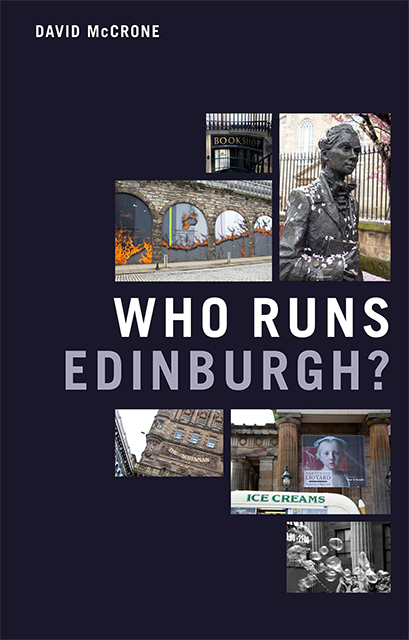Book contents
- Frontmatter
- List of Contents
- Figures and Tables
- Preface
- 1 Who Runs Edinburgh?
- 2 Politics in Edinburgh
- 3 Winners and Losers: The Political Economy of Edinburgh
- 4 Treading Angels: Edinburgh and its Festivals
- 5 Are You One of Us? Status in the City
- 6 What School did You Go To? Education and Status in Edinburgh
- 7 Enlightened City: Cultural Power and University Life
- 8 Developing Edinburgh: Pies in the Sky, Holes in the Ground
- 9 Lost in Leith: Accounting for Edinburgh’s Trams
- 10 Does Anyone Really Run Edinburgh?
- Bibliography
- Index
7 - Enlightened City: Cultural Power and University Life
Published online by Cambridge University Press: 25 October 2023
- Frontmatter
- List of Contents
- Figures and Tables
- Preface
- 1 Who Runs Edinburgh?
- 2 Politics in Edinburgh
- 3 Winners and Losers: The Political Economy of Edinburgh
- 4 Treading Angels: Edinburgh and its Festivals
- 5 Are You One of Us? Status in the City
- 6 What School did You Go To? Education and Status in Edinburgh
- 7 Enlightened City: Cultural Power and University Life
- 8 Developing Edinburgh: Pies in the Sky, Holes in the Ground
- 9 Lost in Leith: Accounting for Edinburgh’s Trams
- 10 Does Anyone Really Run Edinburgh?
- Bibliography
- Index
Summary
Edinburgh is unique among Scotland's ‘ancient’ universities in having a university founded by the city, and not by the medieval church. Created in 1583, its purpose was never clear. Historian Michael Lynch expressed this ambivalence nicely:
Was it intended to be a college devoted to the liberal arts or a Protestant seminary, designed to produce much-needed recruit for the parish ministry? Was it to be a new-style college or old-style university? Was it to be a college for the town, or an institution meant to attract students from afar? The irony is that the scheme was, at one time or another in its pre-history, all of these things. (Lynch, in Anderson et al. 2003: 6)
In this chapter I will explore the centrality of the University of Edinburgh to cultural and social life in the city. Readers might cavil at that, on the grounds that it is, these days, not the only university in the city; that there is much more to ‘enlightenment’ than the university in question, particularly in the shape of cultural and professional institutes; and that, arguably, the University of Edinburgh has played a less than fulsome part in the cultural and intellectual life of the city, certainly for one considering itself the Tounis College.
UNDERSTANDING THE TOUNIS COLLEGE
The university, through Edinburgh University Press, published an ‘illustrated history’ in 2003, written by three of its most prominent historians: Michael Lynch, who dealt with the creation of the college; Nick Phillipson, who wrote about the making of an enlightened university; and Robert Anderson, the construction of the modern university. The book is short –just over 200 pages including pictures and illustrations –and published 20 years after its tercentenary, for reasons not given in the book, but possibly because in 1983, the university was going through one of its periodic financial crises, and thought that it could not commit to spending money on something as ‘impractical’ as a history. The late Michael Moss, University of Glasgow historian, in a review in the English Historical Review, observed that:
The book is a good read, but it is deeply frustrating. Every page leaves questions unanswered. This is not the fault of the talented troika but of the constraints of space.
- Type
- Chapter
- Information
- Who Runs Edinburgh? , pp. 168 - 194Publisher: Edinburgh University PressPrint publication year: 2022



